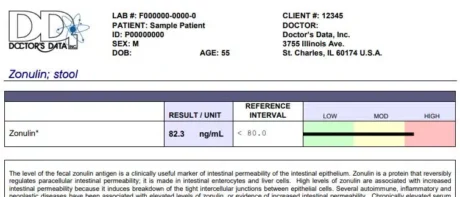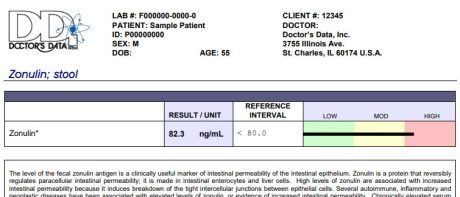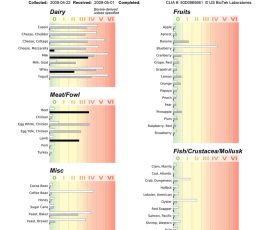Zoulin is a protein that may open the tight junctions between the cells in the wall of the intestine. Elevated levels of zonulin have been identified as the potential doorway to intestinal hyperpermeability (commonly called “leaky gut syndrome”). Increased intestinal permeability may be a contributory factor in Crohn’s Disease and other inflammatory, autoimmune and gastro-intestinal diseases as well as on symptoms or even diseases occuring outside the digestive system.
The pathway from the intestinal lumen and the circulatory system is normally tightly regulated. If zonulin is up-regulated for excessive periods of time an increase in antigens can cause both intestinal and extra-intestinal autoimmune disorders in genetically susceptible individuals.
You can read more about intestinal permeability here.

Zonulin Faecal Test Sample Report
Who Should Test Stool Zonulin?
If you have, or have recently had, any of the following common conditions you should consider a stool zonulin test.
- Irritable Bowel Syndrome
- Small intestinal bacterial overgrowth
- Crohn’s disease
- Diabetes
- Ankyosing spondylitis
- Dementia
- Schizophrenia
- Multiple sclerosis
- Cancers
- Asthma
- Bacterial or parasitic infection
- Chronic headaches
- Cirrhosis of the liver
- Polycystic Ovarian Syndrome (PCOS)
Serum zonulin is not currently available and as zonulin released into the intestinal lumen cannot normally cross the intestinal wall and there is lack of clarity amongst researchers as to whether this means that serum zonulin is a useful marker of intestinal permeability compared to faecal zonulin. At least one study found no correlation between serum and stool zonulin levels.

A gut that leaks allows more through the intestinal wall than is desirable.
Test method: ELISA
References
- https://pubmed.ncbi.nlm.nih.gov/28537581/
- https://www.ncbi.nlm.nih.gov/pmc/articles/PMC5053220/
- https://www.ncbi.nlm.nih.gov/pmc/articles/PMC7372911/
- https://www.ncbi.nlm.nih.gov/pmc/articles/PMC5207627/
- https://www.ncbi.nlm.nih.gov/pmc/articles/PMC6163724/













Reviews
There are no reviews yet.